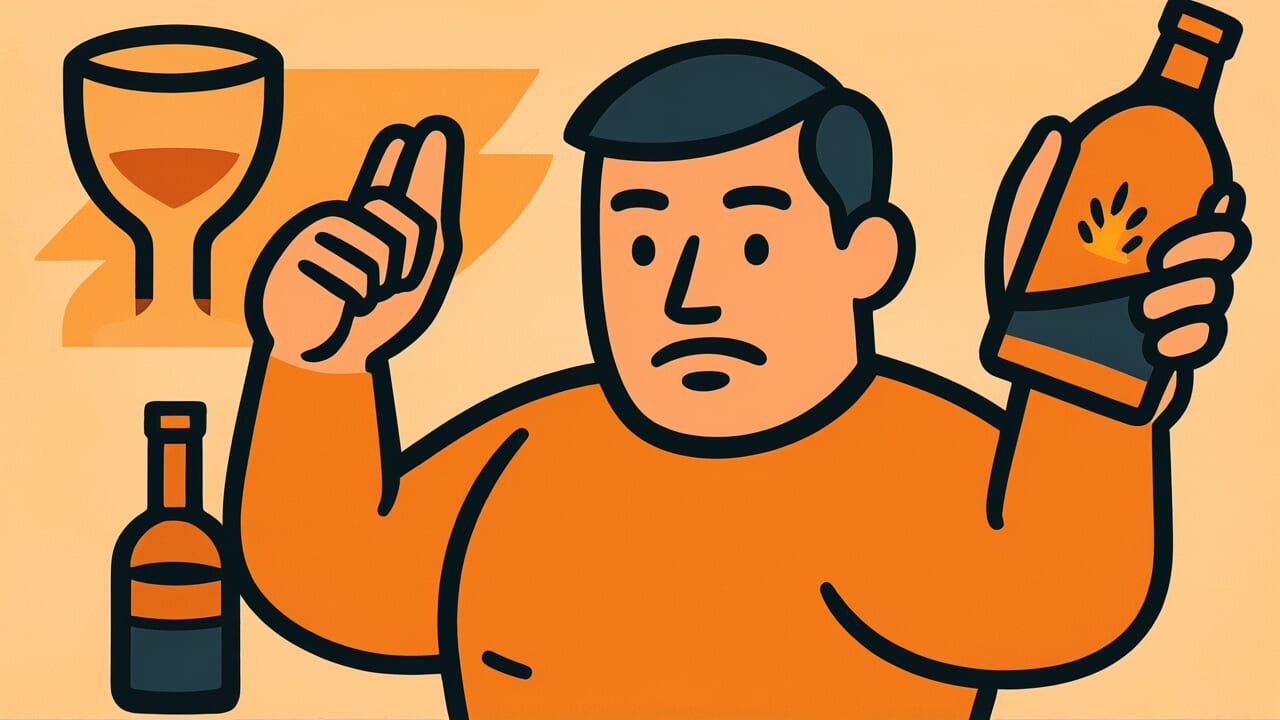How to Read “A non-drinker’s strong hand”
Geko no tegō
Meaning of “A non-drinker’s strong hand”
“A non-drinker’s strong hand” is a proverb that means people who don’t drink alcohol tend to have stronger personalities and take more assertive attitudes.
This proverb comes from observing human behavior at drinking gatherings. People who drink alcohol become relaxed and softer in their attitudes, sometimes becoming more compromising.
But people who don’t drink stay clear-headed and tend not to bend their opinions. Because they remain sober while watching everyone else get drunk, they can maintain a firm attitude throughout.
Even today, this saying is used when non-drinkers at parties give harsh looks to drunk people or speak their minds clearly.
It describes a certain strength or stubbornness in people who maintain themselves without relying on alcohol. Interestingly, it’s not always negative—it can also acknowledge someone’s inner strength.
Origin and Etymology
Clear written records about the origin of “A non-drinker’s strong hand” are limited. However, we can make interesting observations from how the phrase is constructed.
“Geko” (下戸) refers to people who can’t or don’t drink alcohol. This word has been used since ancient times, established as the opposite of “jōgo” (上戸), meaning people who drink.
“Tegō” (手剛) means the same as “tegowai” (手強い)—having a fierce temperament and being strong-willed.
This proverb likely emerged from human observation within Japanese drinking culture. Drinking gatherings have long functioned as places to smooth human relationships.
When people drink, most become relaxed, gentler than usual, or speak their true feelings. In such settings, people who don’t drink stand out because they stay calm, never lose emotional control, and maintain a firm attitude.
Among drinkers, there’s an atmosphere where mistakes or saying too much are forgiven because “it was at a drinking party.” But this excuse doesn’t work for non-drinkers.
They’re always sober and responsible for their words and actions. This attitude probably appeared “strong-willed” or “tough” to others around them.
From these observations, this proverb was likely born.
Usage Examples
- He’s got a non-drinker’s strong hand—he never bends his opinion even at drinking parties, which makes him reliable
- Our manager who doesn’t drink has a non-drinker’s strong hand—he’s always calm and tough in negotiations
Universal Wisdom
“A non-drinker’s strong hand” contains deep insight about the essential weakness and strength of human nature.
We humans relax ourselves or become different people by relying on something. Alcohol is the most obvious example.
Many people use alcohol to ease tension, speak their true feelings, and sometimes make mistakes. And there’s a culture where this is somewhat forgiven with the excuse “I was drunk.”
However, people without such an “escape route” must constantly face themselves. Non-drinkers exist as their sober selves in every situation and must take responsibility for all their words and actions.
This can be lonely at times, creating a temperature gap with those around them. Perhaps that’s why they must take strong attitudes—to protect themselves or stick to their beliefs.
This proverb teaches us both the comfort of depending on something and the harshness of living without relying on it.
The kindness that allows weakness and the determination to maintain strength—both are expressions of humanity. Our ancestors observed both sides.
We all waver between the weakness of wanting to rely on something and the strength of wanting to maintain ourselves.
When AI Hears This
The phenomenon where non-drinkers become more aggressive when drunk shows vulnerability in the brain’s inhibition system.
The prefrontal cortex is the brain’s supreme commander, governing reason and sociability. But it’s extremely vulnerable to alcohol.
Even at relatively low blood alcohol concentrations around 0.05%, prefrontal cortex activity drops significantly. Meanwhile, primitive brain regions like the amygdala and hypothalamus, which generate aggression and desire, have structures resistant to alcohol’s effects.
What’s important here is that people who don’t usually drink haven’t developed “alcohol tolerance” in their brains.
Habitual drinkers’ prefrontal cortexes develop a kind of defense mechanism that partially compensates for alcohol-induced functional decline.
But when non-drinkers drink, this compensation system doesn’t exist. Their prefrontal cortex suddenly shuts down, and aggression that’s normally strictly suppressed erupts defenseless.
In other words, “A non-drinker’s strong hand” demonstrates a paradox of nervous system vulnerability. The stronger the inhibition, the greater the backlash when the inhibition device breaks.
People who moderately express emotions regularly have developed balanced dialogue circuits between the prefrontal cortex and instinctive brain.
But people who constantly suppress with reason have underdeveloped circuits, relying only on suppression. So when the switch flips, they become uncontrollable.
Lessons for Today
“A non-drinker’s strong hand” teaches us about the strength of not depending on things and the loneliness that strength brings.
In modern society, we depend on various things beyond just alcohol. We seek approval on social media, consume things to relieve stress, and sometimes bend our opinions to go with the group atmosphere.
Having such “cushions” helps us live more easily in society.
But this proverb asks us: What is true strength? Isn’t it standing on your own feet without relying on anything, speaking in your own words, and sticking to your beliefs?
Of course, you don’t need to be strong all the time. Sometimes it’s important to rely on something and relax.
But when it matters, we want to have the inner strength to maintain ourselves without being swept away. Especially when everyone around us is relaxed, we want to calmly assess the situation and take a firm attitude when necessary.
Let’s gradually cultivate that kind of strength. Believe in the strength within you that doesn’t rely on anything.



Comments